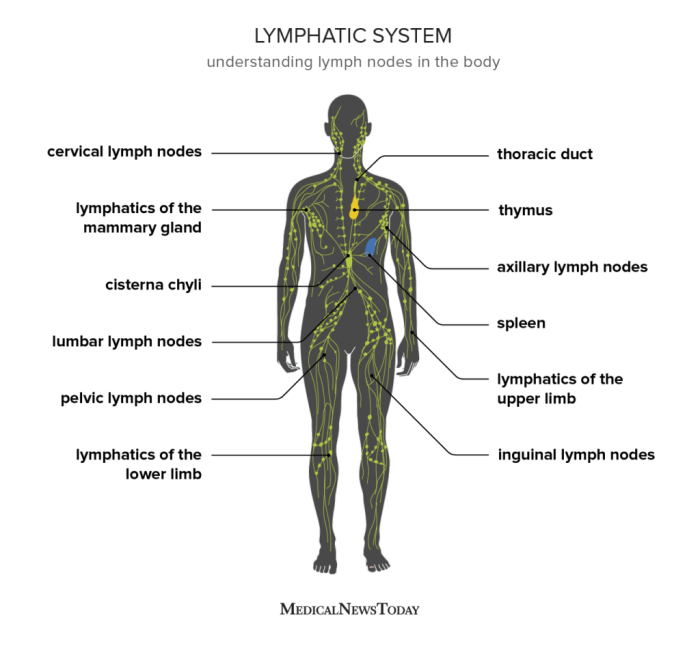What is the importance of lymph milady – Lymph’s Importance: A Cornerstone of Health and Immunity: Delving into the lymphatic system, we uncover its intricate network and vital functions, shedding light on its significance for maintaining overall well-being and immune defense.
The lymphatic system, a complex network of vessels, nodes, and tissues, plays a multifaceted role in maintaining fluid balance, transporting nutrients and waste, and bolstering the immune response. Understanding its importance empowers us to appreciate the delicate balance within our bodies and the profound impact it has on our health.
Lymph System: Overview
The lymphatic system is a complex network of vessels, nodes, and tissues that plays a crucial role in maintaining fluid balance, removing waste products, and supporting the immune system. This intricate system complements the circulatory system and works in tandem to ensure the body’s overall well-being.
Anatomy and Structure
The lymphatic system consists of:
- Lymph nodes:Small, bean-shaped structures located throughout the body that filter and trap pathogens, bacteria, and other foreign substances.
- Lymph vessels:A network of thin-walled channels that transport lymph throughout the body, similar to veins in the circulatory system.
- Lymph tissues:Specialized tissues found in various organs, such as the spleen and tonsils, that contain large numbers of lymphocytes, a type of white blood cell essential for immune function.
Role in Fluid Balance and Waste Removal
The lymphatic system plays a crucial role in maintaining fluid balance by collecting excess fluid from tissues and returning it to the bloodstream. It also helps remove waste products from the body, such as cellular debris, bacteria, and toxins, which are transported to lymph nodes for filtration and elimination.
Functions of Lymph

Nutrient, Hormone, and Waste Transport
Lymph transports nutrients, hormones, and waste products throughout the body. It absorbs nutrients from the digestive tract and carries them to cells, while hormones are transported from endocrine glands to target organs. Additionally, lymph removes waste products, such as carbon dioxide and urea, from tissues and transports them to the kidneys for excretion.
Immune Defense
The lymphatic system is a vital part of the body’s immune defense system. Lymph contains white blood cells, including lymphocytes, which play a crucial role in fighting infections. Lymph nodes act as filters, trapping pathogens and foreign substances, allowing lymphocytes to attack and eliminate them.
Fluid Balance and Edema Prevention
The lymphatic system helps maintain fluid balance and prevents edema (swelling) by collecting excess fluid from tissues and returning it to the bloodstream. When fluid accumulates in tissues, it can cause swelling and discomfort. The lymphatic system helps prevent this by draining excess fluid and maintaining the proper balance of fluids in the body.
Lymph Drainage and Circulation
Lymphatic Drainage System
The lymphatic drainage system consists of a network of vessels and nodes that collect and transport lymph from tissues throughout the body. Lymph flows through the vessels and nodes, where it is filtered and cleansed, before being returned to the bloodstream.
Lymph Circulation
Lymph circulation is a continuous process driven by various factors, including muscle contractions, breathing, and the pumping action of lymphatic valves. Lymph flows from the tissues into the lymphatic vessels and then passes through lymph nodes before returning to the bloodstream.
Valves in the lymphatic vessels prevent lymph from flowing backward, ensuring proper circulation.
Factors Affecting Lymph Flow and Blockages
Several factors can affect lymph flow, including:
- Muscle contractions:Muscle movement helps pump lymph through the vessels.
- Breathing:Deep breathing creates pressure changes that aid in lymph circulation.
- Lymphatic valves:Valves prevent lymph from flowing backward, ensuring proper circulation.
- Blockages:Obstructions in the lymphatic vessels, such as tumors or scarring, can impair lymph flow and lead to lymphedema.
Lymph and Immunity

Role in Immune Response
The lymphatic system plays a crucial role in the body’s immune response. Lymph nodes are strategically located throughout the body to filter and trap pathogens, bacteria, and other foreign substances. These substances are then presented to immune cells, such as lymphocytes, which recognize and destroy them.
Lymph Nodes as Filters
Lymph nodes act as filters, removing pathogens and foreign substances from lymph. They contain specialized cells that capture and engulf these substances, preventing them from spreading throughout the body. Lymphocytes in the lymph nodes recognize and destroy the pathogens, producing antibodies that provide immunity against future infections.
Production and Circulation of Immune Cells, What is the importance of lymph milady
The lymphatic system is involved in the production and circulation of immune cells, particularly lymphocytes. Lymphocytes are produced in the bone marrow and thymus and then circulate throughout the body via the lymphatic system. They are essential for recognizing and eliminating pathogens, providing the body with immune protection.
Disorders of the Lymph System: What Is The Importance Of Lymph Milady

Common Disorders
Several disorders can affect the lymphatic system, including:
- Lymphedema:A condition characterized by the accumulation of fluid in tissues, causing swelling. It can result from damage to or obstruction of the lymphatic vessels.
- Lymphangitis:An infection of the lymphatic vessels, typically caused by bacteria.
- Lymphoma:A type of cancer that affects the lymphatic system, characterized by the abnormal growth of lymphocytes.
Symptoms, Causes, and Treatment
Symptoms of lymphatic disorders vary depending on the specific condition. Lymphedema can cause swelling, heaviness, and discomfort in the affected area. Lymphangitis may present with redness, pain, and swelling along the affected lymphatic vessel. Lymphoma can manifest as swollen lymph nodes, fatigue, and weight loss.
Causes of lymphatic disorders can include infections, injuries, and underlying medical conditions. Treatment options vary depending on the disorder and may involve antibiotics, surgery, or other therapies.
Impact on Health and Well-being
Lymphatic disorders can significantly impact overall health and well-being. Lymphedema can lead to discomfort, mobility issues, and increased risk of infection. Lymphangitis can spread bacteria throughout the body, potentially causing serious complications. Lymphoma can disrupt the immune system, making the body more susceptible to infections and other health problems.
Common Queries
What is the lymphatic system?
The lymphatic system is a network of vessels, nodes, and tissues that helps drain excess fluid from tissues, transport nutrients and waste products, and support the immune system.
What are the main functions of the lymphatic system?
The lymphatic system plays a crucial role in maintaining fluid balance, transporting nutrients and waste, and supporting the immune system.
How does the lymphatic system help the immune system?
The lymphatic system helps the immune system by filtering out bacteria, viruses, and other foreign substances from the body and transporting them to lymph nodes, where they can be destroyed.